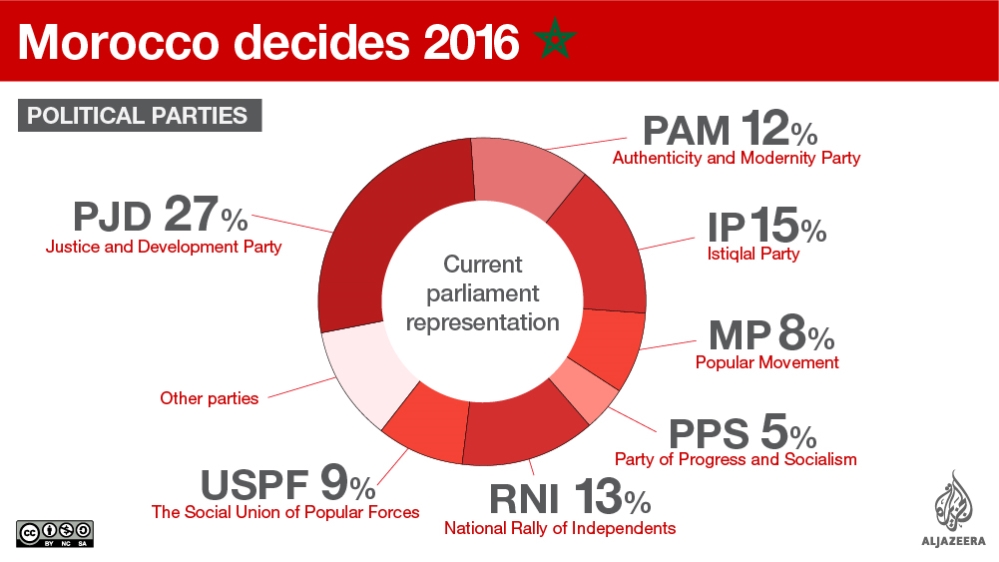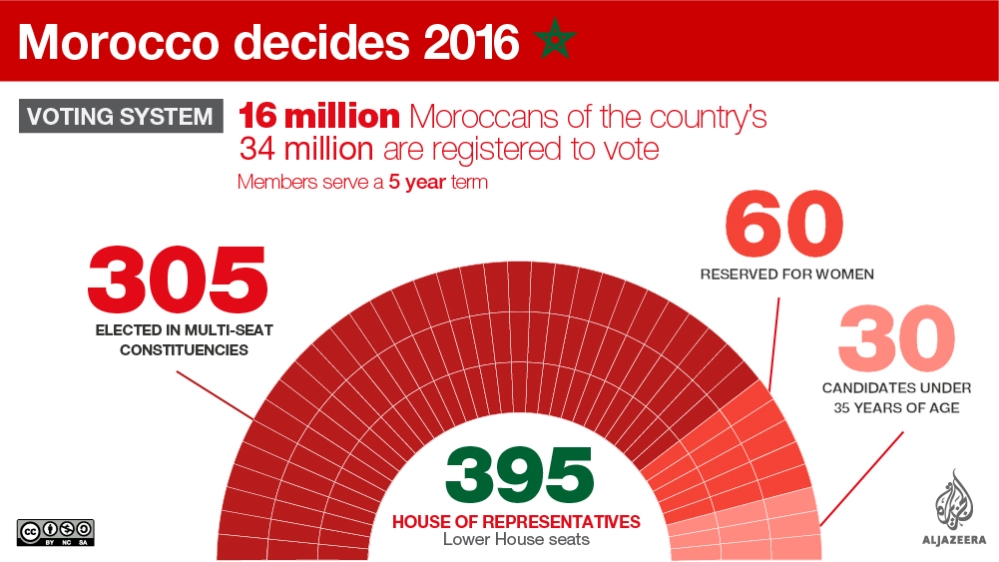Moroccans vote in crucial parliamentary elections
Initial turnout is reported as low as 10 percent as Moroccans vote to elect the 395-member Chamber of Representatives.

Rabat, Morocco – Voting is under way in Morocco for the kingdom’s 10th parliamentary elections since independence in 1956 to define a new political map for the North African country.
In the first official announcement on the elections on Friday, Moroccan Interior ministry said turnout was 10 percent as of 12pm, four hours after the opening of the polls.
Keep reading
list of 4 itemsSolomon Islands prepares for ‘most important election since independence’
Six takeaways from first day of Trump’s New York hush money criminal trial
Manipur’s BJP CM inflamed conflict: Assam Rifles report on India violence
About 16 million Moroccans out of the country’s 34 million people have registered to vote.
In the previous local and parliamentary elections, voters in Morocco tend to show up at voting posts in big numbers in the afternoon hours.
In addition, Friday is a working day in Morocco and people are expected to cast their votes after working hours.
Polls will close at 6pm and official results are expected to follow in the early hours of Saturday.
Voters from Morocco’s 95 electoral districts are electing members to serve five-year terms in the 395-member Chamber of Representatives, the lower house of parliament.
The winning party will be entrusted by King Mohammed VI with forming a coalition government.
No decisive victory is predicted from these elections as the multi-party system in the kingdom makes it impossible for any political party to win an absolute majority, forcing any winning party to work with other parties to form a coalition government.
Voters talking to Al Jazeera generally agreed on their expectations from the elections.
Many expect from the next government to alleviate the situation of healthcare, education and find new mechanism to generate employment, which remain major social challenges that previous governments failed to handle.

“People have lost confidence in politicians and political parties, and I don’t think the turnout will be high,” analyst Jamal Ben Issa told Al Jazeera.
“Most of the leading parties in Morocco have been tested before, but failed to translate their promises in the electoral campaigns into achievements on the ground,” he said.
With more than 30 parties to choose from, many of which have no clear platform, voters seem to be turning to religion and nationalism to guide their political choices, Ali Sedjari, UNESCO’s human rights chairman and professor of juridical science at Mohammed V University in Rabat, told Al Jazeera.
READ MORE: Morocco election – everything you need to know
The ruling Islamic Justice and Development Party (PJD) is vying for a second consecutive term in office after winning the 2011 vote for the first time.
If PJD wins and leads a new coalition government, it will be the first party in the modern history of the kingdom to do so.
But the battle will not be easy. PJD is expected to face stiff competition, especially from the opposition Authenticity and Modernity Party (PAM), which won local elections in 2015.

The Istiqlal (Independence) Party – the oldest in the country, founded in 1944 – is also projected to do well in this vote.
Some analysts say PJD’s attraction has waned after the Islamist party played its role in absorbing the Arab Spring revolutionary spirit that ignited in Morocco in 2011 as part of the regional uprisings.
According to Duke University political scientist Abdeslam Maghraoui, a North Africa expert, Morocco’s monarchical institution is unlikely to still view PJD leader Abdelilah Benkirane as a real political partner, now that the threat of the uprisings is over.
“The PJD basically helped the monarchy navigate the pressure of the youth uprisings in the region,” Maghraoui said, adding that the monarchy has emerged more powerful in the wake of the Arab Spring.
READ MORE: The fall and the rise of Morocco’s left
Morocco has been going through major social challenges from healthcare to education. According to the World Bank, more than one fifth of young people are out of work.
“We need employment, decent accommodation, a good health system and better education. Corruption in the country, which remains widespread in both the public and business spheres, has to end as well,” Mansouri Badr, a senior bank officer, told Al Jazeera.
|
|